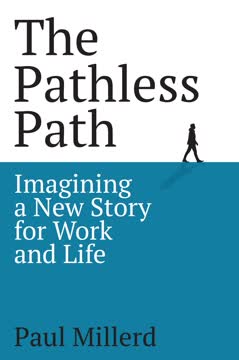Key Takeaways
1. Nietzsche's critique of modern life and technology
"We are faltering, but we must not let it make us afraid and perhaps surrender the new things we have gained. Moreover, we cannot return to the old, we have burned our boats; all that remains is for us to be brave, let happen what may."
Nietzsche's relevance today. Friedrich Nietzsche, writing in the late 19th century, offers a surprisingly prescient critique of modern life that resonates in our digital age. He warns against the pursuit of comfort, ease, and constant distraction, seeing them as threats to human greatness and creativity. Nietzsche's philosophy challenges us to examine how technology shapes our lives and whether it serves our highest aspirations.
Technology's double-edged sword. While recognizing technology's potential to liberate human energies, Nietzsche cautions against its tendency to:
- Commodify human work and creativity
- Encourage passivity and conformity
- Distract us from deeper engagement with life
His insights prompt us to consider how we can harness technology's benefits while mitigating its risks to human flourishing.
2. The danger of the "last man" and the need for self-overcoming
"The earth has become small, and on it hops the last man, who makes everything small. His race is as ineradicable as the flea-beetle; the last man lives longest."
The "last man" as cautionary tale. Nietzsche's concept of the "last man" represents a humanity that has lost its drive for greatness, content with comfort and petty pleasures. This idea serves as a warning about the potential consequences of prioritizing ease and security over creative struggle and self-improvement.
Embracing self-overcoming. To counter this tendency, Nietzsche advocates for:
- Continuous self-improvement and growth
- Embracing challenges and difficulties
- Striving for excellence and creativity
- Cultivating a "will to power" directed towards self-mastery
This philosophy of self-overcoming encourages us to view life as an ongoing process of growth and transformation, rather than a pursuit of comfort and stasis.
3. Cultivating a goal-driven life of creative excellence
"Formula of our happiness: a Yes, a No, a straight line, a goal."
The importance of purpose. Nietzsche emphasizes the need for clear, meaningful goals to give direction and significance to life. He argues that without such purpose, we risk falling into nihilism or the pursuit of trivial pleasures.
Characteristics of Nietzschean goals:
- Positive and creative rather than merely restrictive
- Challenging and requiring excellence
- Self-overcoming, continually pushing beyond current limits
- Serving life and enhancing human potential
By setting and pursuing such goals, Nietzsche believes we can find deeper fulfillment and contribute to the advancement of human culture and capabilities.
4. The importance of selective information consumption
"How can anyone become a thinker if he does not spend at least a third of the day without passions, people, and books?"
Information overload in the digital age. Nietzsche's concerns about information overload are even more relevant today, with our constant exposure to digital content. He warns that excessive consumption of information can overwhelm our ability to think deeply and creatively.
Strategies for mindful consumption:
- Selective reading and rereading of valuable works
- Embracing forgetting as a necessary mental process
- Creating space for solitude and reflection
- Cultivating the ability to focus and resist distraction
By adopting these practices, we can develop a more intentional relationship with information, allowing for deeper understanding and original thought.
5. Embracing physical engagement with the world
"Sit as little as possible; give no credence to any thought that was not born outdoors while one moved about freely—in which the muscles are not celebrating a feast, too."
The wisdom of the body. Nietzsche challenges the mind-body dualism prevalent in Western philosophy, arguing that our physical experiences are crucial to our thinking and being. He emphasizes the importance of embodied engagement with the world.
Benefits of physical engagement:
- Enhanced creativity and problem-solving
- Deeper connection to our environment and others
- Improved mental and emotional well-being
- Development of practical skills and craftsmanship
By prioritizing physical activity and sensory experiences, we can counteract the sedentary and screen-focused tendencies of modern life.
6. The value of solitude and forgetting in the digital age
"Forgetfulness is . . . an active—in the strictest sense, positive—inhibiting capacity, responsible for the fact that what we absorb through experience impinges as little on our consciousness during its digestion as does the whole manifold process of our physical nourishment."
The necessity of mental space. In an age of constant connectivity and information overload, Nietzsche's emphasis on solitude and forgetting becomes crucial. He argues that these practices are essential for developing original thoughts and maintaining mental health.
Practicing mental hygiene:
- Regularly disconnecting from digital devices
- Creating time for unstructured thought and reflection
- Embracing boredom as a catalyst for creativity
- Letting go of unnecessary information and past experiences
These practices can help us maintain mental clarity and resilience in the face of overwhelming digital stimuli.
7. Balancing Nietzsche's individualism with human connection
"Nietzsche hated the normal person because he could not be one."
The limits of extreme individualism. While Nietzsche's philosophy celebrates individual excellence and self-reliance, his personal life reveals the potential pitfalls of extreme isolation. His loneliness and difficulty forming lasting relationships serve as a cautionary tale.
Finding balance:
- Recognizing the value of community and shared experiences
- Cultivating meaningful relationships alongside personal growth
- Engaging in communal focal practices that bring people together
- Using technology to enhance rather than replace human connection
By tempering Nietzsche's individualism with an appreciation for human connection, we can strive for personal excellence while maintaining the social bonds that enrich our lives and support our growth.
Last updated:
Review Summary
In Emergency, Break Glass receives mostly positive reviews for its accessible introduction to Nietzsche's philosophy and its application to modern technology issues. Readers appreciate Anderson's balanced approach, acknowledging Nietzsche's flaws while extracting valuable insights. The book offers a thoughtful critique of excessive screen time and information overload, encouraging readers to pursue a more meaningful, active life. Some criticize the book's fragmented structure and perceived forced connections between Nietzsche and technology. Overall, reviewers find it engaging and thought-provoking, with practical suggestions for developing a healthier relationship with technology.
Similar Books










Download PDF
Download EPUB
.epub digital book format is ideal for reading ebooks on phones, tablets, and e-readers.




